• Federal Workers Oppose Government Lock Out
• Debt Ceiling Showdown and Possible Emergency Measures by Obama
• Obama and Monopoly Financiers Meet
Federal Workers Oppose Government Lock Out
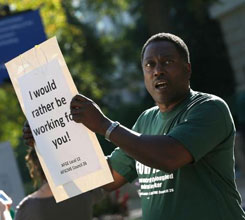 An estimated 800,000 federal workers have been locked out of their jobs, as the federal government shut down at midnight September 30. This occurred when Congress failed to pass a new budget for fiscal 2014, which began October 1. Federal workers across the country, from many different departments, such as the Departments of Agriculture, Education, Health and Human Services, Housing and Urban Development, National Institute of Health, Small Business Administration, have all been forced out of their jobs indefinitely. Many more workers are being forced to stay on the job without pay and without knowing for how long or when they will be paid.
An estimated 800,000 federal workers have been locked out of their jobs, as the federal government shut down at midnight September 30. This occurred when Congress failed to pass a new budget for fiscal 2014, which began October 1. Federal workers across the country, from many different departments, such as the Departments of Agriculture, Education, Health and Human Services, Housing and Urban Development, National Institute of Health, Small Business Administration, have all been forced out of their jobs indefinitely. Many more workers are being forced to stay on the job without pay and without knowing for how long or when they will be paid.
It remains unclear how long the shut down will last, though at present there are few signs even temporary funding for two months can be passed in Congress. It is estimated that $1.6 billion per week in wages are being lost, harming these workers, their families and the economy as a whole.
Federal workers across the country organized picket lines and protests, demanding an end to the lock out and that they not be the ones to bear the burden of a dysfunctional Congress unable to pass a budget. Actions occurred in DC, Philadelphia, Chicago, St. Louis, Kansas City, Los Angeles and many other cities. Demonstrators brought out that federal workers have already sustained a wage freeze for three years, had increases in their retirement contributions, and forced unpaid days off. They emphasized that they provide important services to the public and that they and the public are the ones targeted by the government shutdown. As one worker in St Louis put it, "As taxpayers, we pay for those services, and we want those services to continue." He added, "Right now we don't have a voice in it, and the people who are supposed to be representing us," do not have the workers in mind. It is estimated that concessions imposed on federal workers have already provided about $122 billion to the federal government — most of it handed over to the monopoly financiers in the form of debt payments.
Workers are demanding the federal government not force them to pay for a crisis they did not create. They are demanding an end to the lock out and that funding be provided for social services first and foremost, as their loss impacts the most vulnerable in society like women and children. Some question the fact that Congress, for example, did pass emergency funding September 30 to pay the 1.4 million active duty troops. It did not consider the budget savings — and contribution to world peace — from bringing all U.S. troops home. Salaries for Congresspeople could also be suspended. Dept payments to the Wall Street financiers could be frozen.
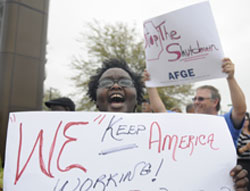 Instead, nearly three-quarters of the workforce have been furloughed in many departments that provide much needed social services, such as assistance with housing and healthcare, the Women's Infants And Children (WIC) programs providing food for impoverished women and children, daycare and more. Disaster relief for Colorado and in New York for recovery from Superstorm Sandy has stopped. All of these basic needs are considered "non-essential" by the government.
Instead, nearly three-quarters of the workforce have been furloughed in many departments that provide much needed social services, such as assistance with housing and healthcare, the Women's Infants And Children (WIC) programs providing food for impoverished women and children, daycare and more. Disaster relief for Colorado and in New York for recovery from Superstorm Sandy has stopped. All of these basic needs are considered "non-essential" by the government.
The Congressional Research Service reports that the federal departments considered "essential" and remaining open include: national security, payment of some benefits (though checks will be delayed depending on the length of the shut down), air traffic control, border protection, care of prisoners, law enforcement, tax collection, maintenance of the power distribution system, and preservation of the money and banking system.
In addition to the direct impact on federal workers, state revenues and programs will also be impacted, which then impacts services their funding provides. The metro DC region, home to many federal workers and an estimated 700,000 jobs that could be impacted by the lock out, could lose $200 million a day. Maryland, for example, expects to lose $5 million a day in lost income-tax and sales-tax revenue during the shutdown, $15 million a day in lost economic activity if the shutdown lasts two weeks. Virginia expects even more. Similar estimates exist for cities and states across the country. As well, state workers whose wages depend in part on federal funding will also be sent home without pay.
The Governor of Arkansas painted a picture common across the country, saying the shut down "Will greatly hinder the ability of the Arkansas Department of Human Services to investigate claims of child abuse and neglect. More than 85,000 meals for Arkansas children will not be provided and protection for nursing-home residents will be reduced. Two thousand newborn babies will not receive infant formula through the Department of Health's WIC program."
Federal workers as well as many others consider the government's designation of what is and is not "essential" to be false and anti-people. Picket signs expressed the view that the interests of the public and their needs for food, healthcare and housing are vital necessities that government is duty-bound to provide. The fight not only on the shutdown but the budget as a whole is one where the issue of whose interests and rights are essential and to be served, and whose are not is at issue. As workers step up efforts to defend their rights and those of the public, this problem of how to contend with a dysfunctional government and stop those in power from imposing these brutal attacks on the public can be addressed.
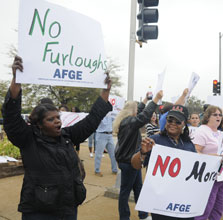
![]()
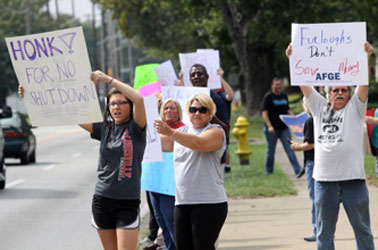
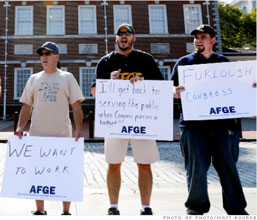
![]()
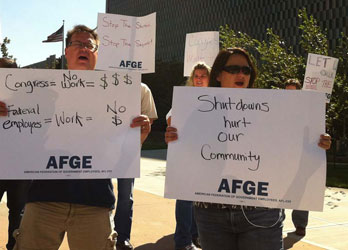
[TOP]
Debt Ceiling Showdown and Possible Emergency Measures by Obama
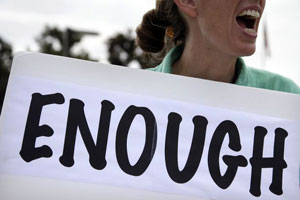 President Obama has repeatedly stated that he will not allow the U.S. government to default on its loans. The statements are being made in the context of the showdown in Congress as to whether to raise the debt ceiling, currently set at $16.7 trillion. The debt ceiling operates as a cap on the amount the U.S. government can borrow, commonly done by securing investments in U.S. Treasury Bonds. The Treasury Department, for example, is expected to ask investors for $120 billion in loans October 17 — also the day the department has said it will have insufficient funds to pay all its obligations, such as payroll, Social Security, Medicare, as well as debt payments.
President Obama has repeatedly stated that he will not allow the U.S. government to default on its loans. The statements are being made in the context of the showdown in Congress as to whether to raise the debt ceiling, currently set at $16.7 trillion. The debt ceiling operates as a cap on the amount the U.S. government can borrow, commonly done by securing investments in U.S. Treasury Bonds. The Treasury Department, for example, is expected to ask investors for $120 billion in loans October 17 — also the day the department has said it will have insufficient funds to pay all its obligations, such as payroll, Social Security, Medicare, as well as debt payments.
At present Congress remains unable to pass any budget appropriations, even short-term funding to reopen the government. More than 800,000 workers remain locked out and many more are working without pay. And despite warnings of "financial catastrophe" by Obama and financiers and calls to end the shutdown and raise the debt ceiling, so far it does not look like Congress will do so.
What then does President Obama have in mind when he says he will not allow a default? Speaking in his Weekly address September 21, before the shutdown, he said: "The most basic Constitutional duty Congress has is passing a budget. But if it doesn't pass one before September 30th — a week from Monday — the government will shut down
"Second: Congress must authorize the Treasury to pay America's bills. This is done with a simple, usually routine vote to raise what's called the debt ceiling. Since the 1950s, Congress has always passed it, and every President has signed it — Democrats and Republicans, including President Reagan. And if this Congress doesn't do it within the next few weeks, the United States will default on its obligations and put our entire economy at risk
"The United States of America is not a deadbeat nation. We are a compassionate nation. We are the world's bedrock investment. And doing anything to threaten that is the height of irresponsibility. That's why I will not negotiate over the full faith and credit of the United States. I will not allow anyone to harm this country's reputation, or threaten to inflict economic pain on millions of our own people, just to make an ideological point."
Speaking October 1 he said, "Congress has to stop governing by crisis. They have to break this habit. It is a drag on the economy. It is not worthy of this country.
"For example, one of the most important things Congress has to do in the next couple of weeks is to raise what's called the debt ceiling This is what Congress is supposed to do as a routine matter . Let me repeat: I will not negotiate over Congress's responsibility to pay its bills it's already racked up. I'm not going to allow anybody to drag the good name of the United States of America through the mud "
In a CNBC interview October 2, speaking of the need to raise the debt ceiling he said, "If we get in the habit where a few folks, an extremist wing of one party, whether it's Democrats or Republicans — are allowed to extort concessions — based on a threat of undermining the full faith and credit of the United States, then any president who comes after me, not just me — will find themselves unable to govern effectively. And that's not something that I'm going to allow to happen."
What Is Obama Prepared to Do?
So what measures will Obama take to "not allow that to happen?" Are conditions being prepared for emergency measures by the president in the name of national security — that the threat of default is so severe that executive action is called for? Will the president lay claim to the power of the purse in the name of a dysfunctional and "irresponsible" Congress?
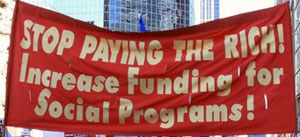 For the past two weeks financiers like the heads of Bank of America, Goldman Sachs and JPMorgan have been endlessly repeating that a default would harm the U.S. and world economy and be "catastrophic," with "extreme adverse" consequences as the financiers put it. They are concerned that government payments on the debt will not be made and even put forward the view that these debts must be government's first payments in the event of default. It is their unjust claims on the economy and public purse that they are worried about. It is much like when monopolies declare bankruptcy — everyone is supposed to support that first the financiers involved get paid, while the workers' pensions and healthcare are cut or eliminated. For the government, the cuts would be to Social Security, Medicare, federal payroll and more while debt payments are guaranteed. Workers have long experience with the fact that the bankruptcies are used to steal their pensions and healthcare, cut wages in half, eliminate jobs and eliminate unions. They do not solve any problems the people face and in fact increase them while further harming the economy.
For the past two weeks financiers like the heads of Bank of America, Goldman Sachs and JPMorgan have been endlessly repeating that a default would harm the U.S. and world economy and be "catastrophic," with "extreme adverse" consequences as the financiers put it. They are concerned that government payments on the debt will not be made and even put forward the view that these debts must be government's first payments in the event of default. It is their unjust claims on the economy and public purse that they are worried about. It is much like when monopolies declare bankruptcy — everyone is supposed to support that first the financiers involved get paid, while the workers' pensions and healthcare are cut or eliminated. For the government, the cuts would be to Social Security, Medicare, federal payroll and more while debt payments are guaranteed. Workers have long experience with the fact that the bankruptcies are used to steal their pensions and healthcare, cut wages in half, eliminate jobs and eliminate unions. They do not solve any problems the people face and in fact increase them while further harming the economy.
For the public treasury it is no different. The financiers want their hands on all of it. Guaranteeing their debt payments is one aspect of this, as are cuts to social programs. As Obama himself indicates, the financiers' demand to pay debts will be utilized to further cut Social Security and Medicare. With CNBC Obama said, "It's important for us to deal with our long-term entitlement spending," which means more cuts to social programs.
Potential for Presidential Control of the Purse
As can be seen from the quotes above, Obama is also targeting governance. He emphasizes that he will not allow a default. He targets Congress, and what he calls "extremists" of either party. He speaks to the ability of the president to govern effectively and the need to end governing by crisis. He has broad backing from the financiers to act to guarantee debts to them are paid.
A situation also exists where people are broadly and justly angered with Congress. This stems not so much from the debt ceiling showdown itself, but rather that Congress is dysfunctional as a governing body. Needed legislation such as that on immigration is not passed and budgets and laws passed repeatedly force workers to carry the burden of an economic and political crisis they did not create. Obama can manipulate this anger in the situation, as he strives to gain support for emergency measures by the executive to reopen government and raise the debt ceiling. The appearance is given that such action would prevent threats to Social Security and Medicare and payroll payments. The reality will be presidential control of the purse strings so as to guarantee even more payments to the rich on the backs of the people.
This is further seen by the fact that Obama raises the issue of governing by crisis and not "getting in the habit" of allowing "extremists" to "extort concessions." He was elected by the rulers in part to complete arrangements for presidential rule in service to the private monopoly interests. Congress, and elected governance more generally, stand in the way of the monopolies taking over direct control of the public treasury. From the perspective of the most powerful monopolies, the current situation presents an opportunity for emergency measures by the president that give the executive the power of the purse. And as Obama himself states, this is not just about him but about "any president who comes after me."
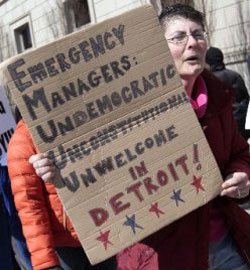 Such emergency measures have already been taken at the state level, in Michigan for example with emergency managers and elsewhere using control boards. Now the possibility exists for such action at the federal level. Once such measures are put in place, they are not likely to be removed. And Obama already has in place executive orders giving him broad powers in the name of a national emergency.
Such emergency measures have already been taken at the state level, in Michigan for example with emergency managers and elsewhere using control boards. Now the possibility exists for such action at the federal level. Once such measures are put in place, they are not likely to be removed. And Obama already has in place executive orders giving him broad powers in the name of a national emergency.
The danger is that with the anger toward Congress and disinformation about the economy, resistance by the people to such executive actions will be blocked and diverted. Worse, various organizations among the workers could well support the president.
Instead, executive measures to grab the power of the purse must be firmly opposed. The opportunity exists for workers to seriously discuss the need to change governance in a manner that favors their interests. Legislative powers need to be expanded and presidential powers restricted. This serves to defend public right while restricting monopoly right and these efforts by the monopolies for unrestricted control of the public purse. Legislative powers need to be modernized by empowering the people themselves to govern and decide.
It is also time to look seriously at the fact that a new direction for the economy is needed. This necessity is kept hidden by all the talk about having to pay the financiers and the supposed "catastrophe" if they are not paid. The wealth is produced by the workers in a socialized economy and they have a right to claim that wealth and decide how best to utilize it for the benefit of society. It is the privatization of public interests by the monopoly owners that is a disaster for the economy and people. Standing against that control and for the rights of the people is the way to begin solving the current problems. An important step toward such a new direction is the stand to:
Stop Paying the Rich, Increase Funding in Social Programs! [TOP]
Freeze the Debts and Stop War Funding!
Defend the Rights of All!
Obama and Monopoly Financiers Meet
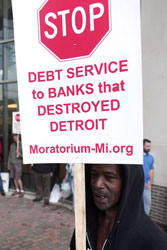 President Obama and chief executives from the major monopoly financial institutions met October 2. The current government shutdown and upcoming showdown on raising the debt ceiling were main topics of discussion. So too were demands by the financiers for major cuts to Social Security and Medicare.
President Obama and chief executives from the major monopoly financial institutions met October 2. The current government shutdown and upcoming showdown on raising the debt ceiling were main topics of discussion. So too were demands by the financiers for major cuts to Social Security and Medicare.
The financiers emphasized that there would be "extremely adverse" consequences if Congress fails to raise the debt ceiling by October 17. There is currently a cap on government debt (or borrowing) of $16.7 trillion. October 17 is the date the Treasury Department has given for when it will no longer have sufficient funds on hand to pay government obligations, like payroll, Social Security, Medicare and veterans benefits.
The Department has been maneuvering since May with public funds so as to keep paying its obligations. This has included, for example, not paying into the federal pension fund as required. October 17 is the day given for when even these moves will fall short. It is also the point where the government could default on its loans, which exist mainly in the form of Treasury bonds. Large debt payments are due on October 24 and October 31. The financiers are especially concerned about these payments. Their "experts" have also put forward the view that if there is a default, the government should first of all pay its debts to these monopoly financiers and then worry about Social Security and payments due to the people.
At the meeting, the financiers emphasized the need to raise the debt ceiling. "There's no debate that the seriousness of the U.S. not paying its debts ... is the most serious thing we have, and we witnessed that in August '11 and you saw the ramifications: a slowdown in the economy," said Brian Moynihan, chief executive of Bank of America.
Goldman Sachs chief executive Lloyd Blankfein said, "There is precedent for a government shutdown. There's no precedent for default. We're the most important economy in the world. We're the reserve currency of the world," said Blankfein. He added, business leaders wanted Washington to understand "the long-term consequences of a shutdown ... certainly the consequences of a debt ceiling (not being raised), and we all agree that those are extremely adverse."
The last time the U.S. came close to default, the financiers lowered the U.S. credit rating as a means to ensure the debt ceiling was raised and government debt payments to these financiers were met. This time, they are saying failure to raise the debt ceiling poses even greater risks to the U.S. and world economies.
Among other executives present at the meeting were Michael Corbat of Citigroup, Jamie Dimon of JPMorgan Chase & Co, Robert Benmosche of AIG, James Gorman of Morgan Stanley, and John Stumpf of Wells Fargo, along with Vice President Joe Biden.
The financiers do not bring out that speaking economically, freezing payments on debt or even canceling them and using the public funds instead to increase funding for social programs, would greatly benefit the economy. Monopoly financiers bent on making profits at any cost to the people would cry foul. Similarly, if the government stopped its payments to the military monopolies and for war, that too would contribute to the economy and world peace. But these alternatives are not to be discussed and instead the current crisis is being used to push for guaranteeing the Wall Street financiers are paid in full.
[TOP]
